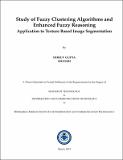Study of fuzzy clustering algorithms and enhanced fuzzy reasoning application to texture based image segmentation
Abstract
c-means (k-means) is a popular algorithm for cluster analysis. Many variants of
c-means algorithms are available. All these models are studied in depth and convergence
of iterative solutions are verified, in this thesis. An example of texture
based image segmentation is used to support this study of various clustering algorithms.
In context of clustering points in a space, a cluster represents a set of elements.
The set is created by studying the membership of each element within it. Conventionally
there are two types of set theories: crisp and its extension fuzzy set theory.
The extension of crisp sets to fuzzy sets in terms of membership functions, is alike
to extension of the set of integers to the set of real numbers. But the development
does not end here, the membership can be extended to a vector value.
Clustering is significantly affected by the data dimensionality and the distance
metric used during cluster formation. Distance between points and distance between
clusters are the key attributes for an accurate cluster analysis. During analysis
of fuzzy based clustering a need for a new distance metric was felt. This
metric defines distance between fuzzy sets and also between elements and fuzzy
sets. As a step to fulfil this requirement, in this work the fuzzy sets with vector
memberships are defined and proposed. Basic set theoretic operations, such as
complement, union and intersection are defined and discussed in axiomatic manner.
This work also proposes a new distance function defined for points and sets,
and the new function is proved to be a metric through systematic proofs.
Collections
- M Tech Dissertations [923]

